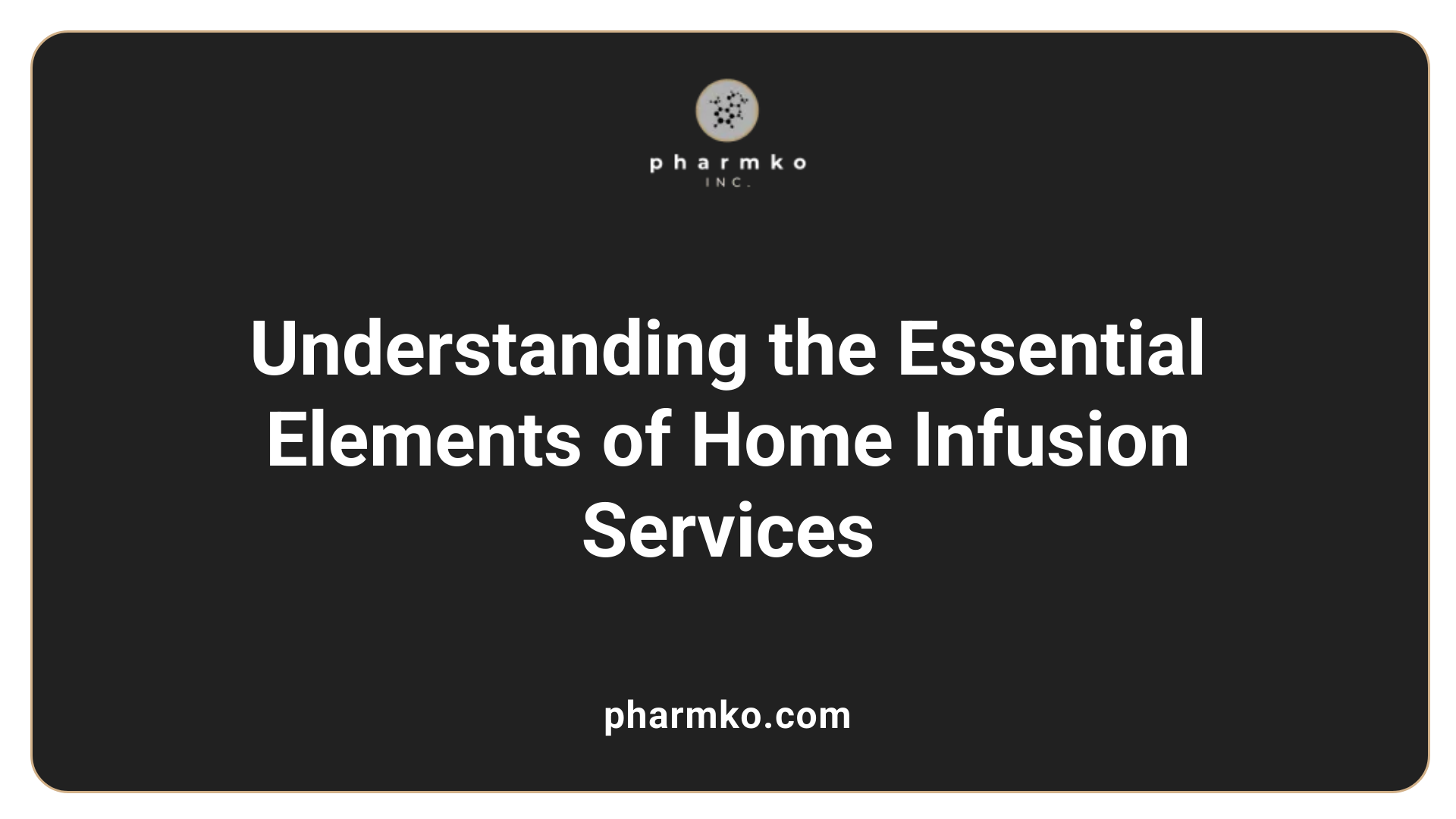Home infusion support services
Understanding Home Infusion Therapy
Home infusion therapy has emerged as a vital healthcare offering, particularly for patients seeking efficient treatment outside hospital settings. This method involves the administration of medication directly into a patient's bloodstream or under their skin in the comfort of their own home, facilitated by trained healthcare professionals. Let's delve into the components, benefits, and mechanisms that underpin this essential service.
The Core Components of Home Infusion Services

What are home infusion services?
Home infusion services involve the administration of medications or biological agents intravenously or subcutaneously to patients in the comfort of their homes. This approach not only includes the necessary medications but also essential equipment such as infusion pumps, tubing, and catheters. In addition to this, professional nursing services are a crucial part of the process.
Nurses in home infusion therapy provide training to patients and caregivers on the safe administration of drugs. They also monitor the infusion process closely to ensure that everything is progressing safely and effectively. Furthermore, the 21st Century Cures Act, effective January 1, 2021, established a Medicare home infusion therapy benefit that encompasses a range of professional services associated with these treatments.
Role of healthcare professionals in home administration
Healthcare professionals, including specialized pharmacists and nurses, play a vital role in the management of home infusion therapy. Their responsibilities include:
- Training and Educating Patients : Instructing individuals and caregivers on how to administer medications safely.
- Monitoring Infusion Sites : Ensuring that there are no complications during the administration process.
- Coordination of Care : Collaborating with various stakeholders such as physicians and health plan representatives to provide comprehensive patient care.
The multiple parties involved highlight the complex, collaborative nature of home infusion therapy. Health insurance plans, including Medicare, typically cover home infusion services, although patients may face some out-of-pocket costs. This therapy not only promotes cost-effectiveness but also enhances patient satisfaction and maintains quality of life by allowing individuals to continue their daily activities while receiving necessary treatments.
Medicare and Home Infusion: Navigating Coverage and Costs

Does Medicare cover home infusion services?
Yes, Medicare does cover home infusion services under Medicare Part B. This coverage is particularly focused on the safe administration of intravenous or subcutaneous drugs provided in the comfort of patients' homes. Key components included in the coverage are necessary medical supplies such as infusion pumps, IV poles, tubing, and catheters.
Patients should be aware that they typically need to pay a 20% coinsurance of the Medicare-approved amount for these services and supplies. This requirement comes after fulfilling the Part B deductible. It’s important that both the physician and durable medical equipment suppliers are enrolled in Medicare and accept assignment, as this can significantly reduce out-of-pocket expenses for patients.
Overall, Medicare aims to support patients requiring home infusion therapy by facilitating access to essential medications and equipment. This effectively promotes a better quality of life as patients can receive necessary treatments without being hospitalized.
Understanding patient costs
Alongside coinsurance, it's beneficial for patients to understand what other costs they might incur. The following table summarizes the key financial aspects for patients receiving home infusion therapy:
| Cost Element | Description | Notes |
|---|---|---|
| Part B Deductible | Initial annual amount must be paid | Needs to be met before coinsurance applies |
| Coinsurance | 20% of the Medicare-approved amount | Applies after deductible is fulfilled |
| Coverage for Supplies | Includes pumps, tubing, and catheters | Essential for treatment at home |
| Eligibility Requirement | Must have an enrolled doctor and suppliers | Helps minimize expenses |
| Update Frequency | Dataset is updated biweekly | Ensures current and accurate information |
In conclusion, understanding the nuances of Medicare coverage and associated costs helps patients effectively manage their home infusion therapy. This not only supports treatment compliance but also contributes to overall patient satisfaction.
Cost Considerations of Home Infusion Therapy

How much does home infusion therapy cost?
The cost of home infusion therapy can vary widely, typically ranging from approximately $200 to over $1,000 per treatment . This variation depends on several factors, including the type of medication, dosage, and the duration of therapy. Patients often need multiple treatments within the year, which can accumulate high total costs.
For instance, the annual cost for rheumatoid arthritis treatment can reach between $36,000 and $47,000 if administered in a hospital setting. In contrast, opting for home infusion therapy can lead to significant reductions in expenses. On average, home infusion costs about $122 per day , whereas inpatient treatment averages $798 per day . This suggests substantial savings, potentially amounting to $40,460 per patient annually.
How does home infusion therapy compare with inpatient care?
The financial benefits extend beyond daily treatment costs. By utilizing biosimilars, many patients can further decrease their expenses by 15 to 35% . This combination of lower daily rates and the option to use cost-effective biosimilars makes home infusion therapy a more attractive and affordable option than traditional inpatient care. The comprehensive nature of home infusion, with essential equipment, medications, and trained nursing support included, often results in lower healthcare costs and increased patient satisfaction.
In summary, home infusion therapy not only allows patients to maintain their independence during treatment but also promotes significant savings when compared to traditional hospital care.
A Closer Look at Common Home Infusions
What are the most common home infusions?
Home infusion therapy encompasses a range of medications and treatments tailored to various medical conditions. The following outlines some of the most common medications utilized in home infusion settings:
| Medication Type | Examples | Usage |
|---|---|---|
| Antimicrobials | Acyclovir (Zovirax®) | Treats viral infections |
| Amikacin (Amikin®) | Addresses severe bacterial infections | |
| Meropenem (Merrem®) | For resistant bacterial infections | |
| Anti-emetics | Granisetron (Kytril®) | Manages nausea and vomiting |
| Ondansetron (Zofran®) | Prevents nausea | |
| Cardiac medications | Dobutamine (Dobutrex®) | Supports heart function |
| Furosemide (Lasix®) | Treats fluid retention in heart failure | |
| Corticosteroids | Dexamethasone (Decadron®) | Reduces inflammation |
| Methylprednisolone (Solu-Medrol®) | Used for various inflammatory conditions | |
| Nutritional support | Total parenteral nutrition | Provides essential nutrients intravenously |
| Customized amino acid solutions | Tailored solutions for patient needs |
Conditions treated with home infusion
Home infusion therapy effectively addresses a multitude of conditions, enhancing patient care and comfort. Typical conditions treated include:
- Infections resistant to oral antibiotics
- Cancer-related pain
- Chronic autoimmune conditions
- Severe dehydration
Patients undergoing home infusion can maintain their quality of life, including resuming work or school while receiving necessary treatments, thanks to the flexibility of administering infusion therapy outside a traditional hospital setting.
Choosing a Home Infusion Provider

Evaluating Home Infusion Providers
When considering home infusion therapy, selecting the right provider is essential for ensuring safe and effective treatment. Here are some factors to evaluate:
- Experience and Expertise : Ensure the provider has extensive experience in administering home infusion therapy and offers a variety of therapies tailored to meet individual needs.
- Quality of Care : Look for providers that have high patient satisfaction ratings and prioritize safety in their services.
- Services Offered : Check if the provider includes necessary components such as nursing services, patient education, and remote monitoring in addition to medication administration.
- Insurance Compatibility : Confirm whether the provider accepts Medicare and other insurance plans to avoid unexpected costs.
Understanding Provider Options
A range of providers is available for home infusion therapy, each with unique offerings. One noteworthy option is Option Care Health , the largest independent provider of infusion therapy services in the U.S. They serve over 2 million patients annually and have more than 170 infusion suite locations across the country. Their focus on improving patient outcomes is complemented by individualized care plans and collaboration with healthcare providers.
Here are some highlights about Option Care Health:
| Feature | Details |
|---|---|
| Coverage | Offers therapies for infectious diseases, cancer, and chronic inflammatory disorders. |
| Patient Satisfaction | Achieved a 95% approval rating from nearly 10,000 surveyed patients. |
| Safety & Convenience | Reduces hospitalizations while ensuring high standards of care through home infusion therapy. |
As you explore your options, consider reaching out to multiple providers to understand their services and strengths better. Identifying a provider that aligns with your needs ensures a smoother home infusion experience.
The Future of Home Infusion Therapy
As healthcare continues to evolve, the role of home infusion therapy is becoming increasingly prominent, offering a blend of convenience, efficacy, and cost-effectiveness to numerous patients. This compassionate alternative to hospitalization empowers individuals by delivering personalized care in familiar surroundings. Choosing the right provider, understanding insurance coverage, and grasping the financial implications are essential steps in optimizing this healthcare option. With dedicated healthcare professionals orchestrating treatment plans, home infusion therapy stands to fundamentally reshape medical care, enhancing both patient outcomes and quality of life.
References
- Home Infusion Therapy/Home IVIG Services - CMS
- Home infusion therapy | Home care providers | NHIA
- Home Infusion Therapy | National Home Infusion Association | NHIA
- Home infusion therapy services, equipment, & supplies - Medicare
- Home Infusion Therapy Providers - CMS Data
- Home infusion therapy services, equipment, & supplies - Medicare
- Infusion pumps & supplies - Your Medicare Coverage
- Durable medical equipment (DME) coverage - Medicare













